Ever added almond milk to your morning cup of coffee and notice it curdling? Coffee lovers rejoice because we’re going over why almond milk curdles, and how to prevent it! Plus, we put some of our favorite almond milk brands to the test to see which ones produce the smoothest and creamiest cup of joe!
If you’re a coffee lover and also a plant-based milk lover, then you might have noticed something funky going on when you add almond milk to your daily cup of joe.
Does this scenario sound familiar… You’ve just finished brewing your first cup of coffee for the day. Thinking it needs a touch of creaminess, you grab your favorite almond milk from the fridge. As you pour a little almond milk into your mug, you see it begin to separate. Your once beautiful cup of coffee is now a curdled mess.
Don’t worry, you’re not alone!
Unfortunately, almond milk can curdle. On the bright side, while almond milk separating might look unappetizing, it is completely safe to consume.
However, we do ”eat with the eyes” so we want to avoid our almond milk from separating in our coffee if possible.
Luckily, there are some tips and tricks for how to prevent your almond milk from curdling so you can enjoy that silky smooth cup of coffee. Let’s get into it!
Why Does Almond Milk Curdle?
Almond milk has grown in popularity in recent years. Currently, it is the most popular plant-based milk on the market, and it’s easy to see why!
Almond milk is a low-calorie plant-based milk option that also contains a good amount of vitamins and minerals like vitamin E and calcium.
When it comes to adding almond milk to your coffee there are two main reasons it can curdle - the temperature or the acidity level.
Temperature
When there is a drastic difference in temperature between the coffee and the almond milk, it causes curdling.
Typically, a cup of coffee is piping hot while the almond milk that’s added has been chilled in the refrigerator.
When cold almond milk is poured into a glass of hot coffee, the protein structures of the almond milk break down quickly and the milk begins to separate.
Acidity Level
In general, coffee is pretty acidic. Depending on the variety of coffee, its pH can range anywhere from 4.85 to 5.10. To put that into perspective, lemon juice has an average pH of 2, while water’s pH is 7.
Almond milk has a more neutral pH that hovers around 6.48. So when almond milk is added to coffee, the coffee quickly breaks down the almond milk and causes it to coagulate.
4 Tips for How to Prevent Almond Milk from Curdling
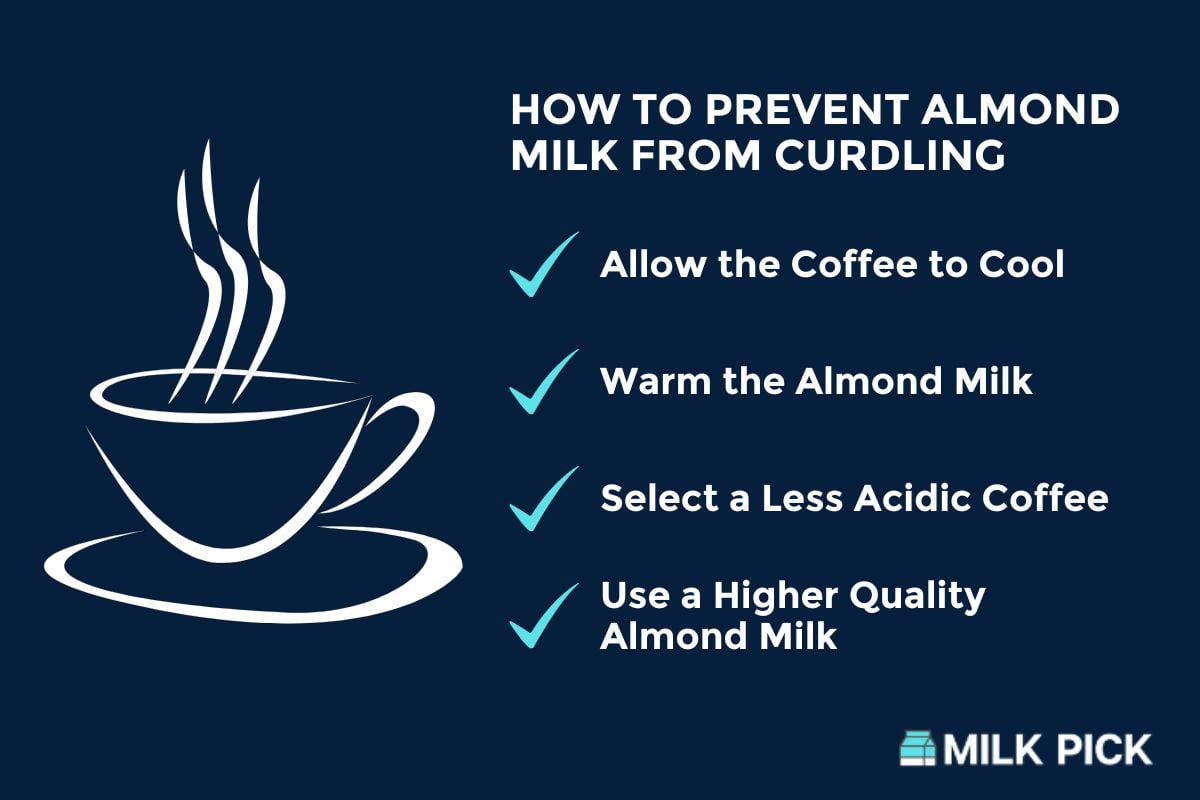
While it is safe to consume separated almond milk, it isn’t the most appetizing. Here are some ways you can prevent your almond milk from curdling:
Allow the Coffee to Cool
Instead of adding almond milk to your cup of coffee right after it’s been freshly brewed, give your coffee a few minutes to cool.
You don’t have to let your coffee become lukewarm, but even just a minute or two can lower the temperature of the coffee enough to prevent curdling.
Warm the Almond Milk
Another way to balance the temperature between the coffee and the almond milk is to warm up the almond milk before adding it to the coffee.
The ideal temperature for warmed almond milk is between 140°F to 150°F (60°C to 65°C).
There are a few methods for heating almond milk - in the microwave, on the stove, or in a double boiler.
If you are interested in learning more tips and tricks for how to heat up almond milk, read our comprehensive guide here!
Select a Less Acidic Coffee
The other option if you don’t want to mess with the temperature of your coffee or milk is to adjust the acidity level of your coffee.
Dark roasts are lower in acidity than light roasts. Typically, the longer the bean roasts the lower the acidity it has. Opt for a dark roast to decrease the likelihood of the chemical reaction occurring that causes coagulation.
Use a Higher Quality Almond Milk
Not all almond milk is created equal. Some brands are better for frothing, some are better for baking, and some are better for adding to coffee!
Barista almond milk is probably the best choice for plant-based coffee lovers.
This is because barista lines tend to have additives that are specifically designed to help the milk hold up to a hot or highly acidic coffee.
Spoiler alert, here's our top pick for barista almond milk.
[lasso ref="amzn-elmhurst-1925-barista-edition-almond-milk-plant-based-vegan-32-ounce-pack-of-6" id="7920" link_id="33989"]
Testing Which Almond Milk Brands Curdle
Now that we’ve learned the basics of why almond milk curdles, it’s time to put some brands to the test!
Today, we are testing seven almond milk brands to see if they curdle when added to a cup of coffee. Here is the line-up of almond milks we are testing today:
Almond Malk
Better Than Milk Organic Almond Milk
Elmhurst Almond Milk Barista Edition
Good Mylk Co Almond Milk Activated Creamer
Three Trees Organics Original Almond Milk
Almond Breeze Almond Milk
Silk Almond Milk
Almond Malk
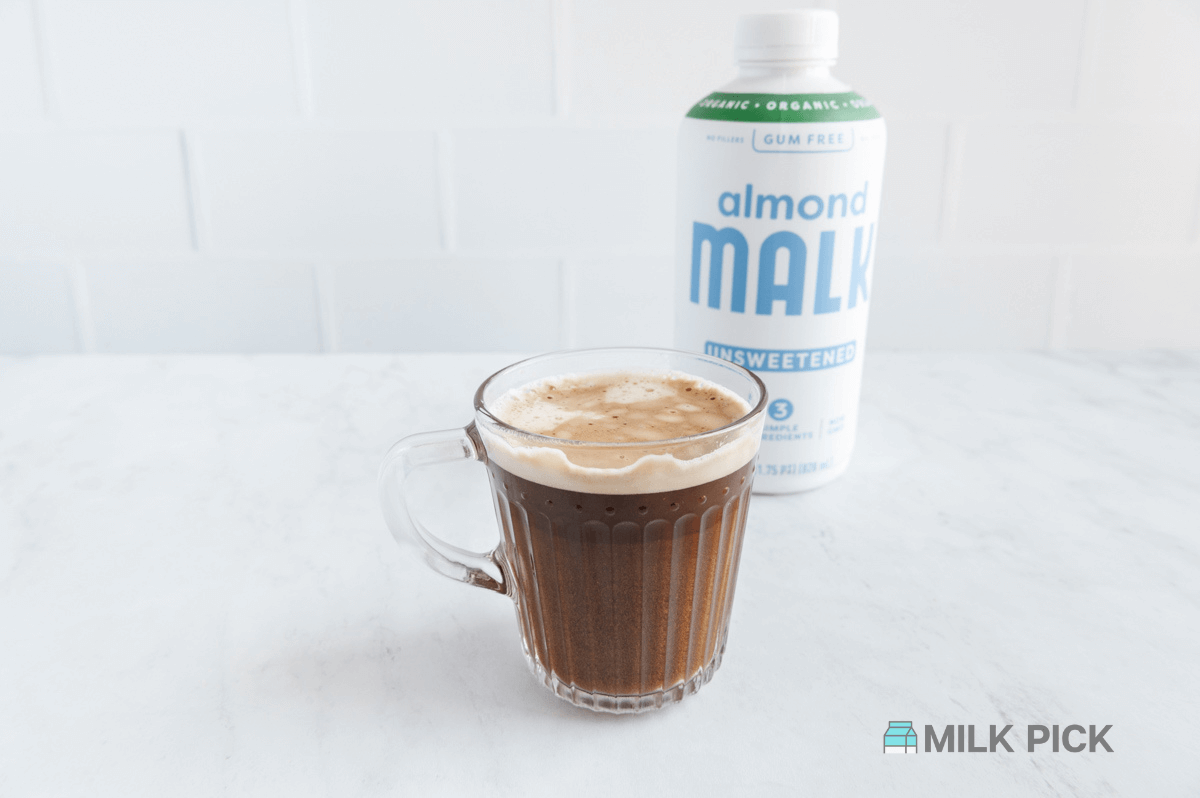
First up is Almond Malk.
It is important to note the ingredients in each of the almond milk brands we are testing today as they might affect whether the milk curdles or not.
Unsweetened Almond Malk has a simple ingredient list of filtered water, organic almonds, and Himalayan Pink Salt.
Sadly, the first test didn’t fare too well. There was a good amount of separation and texture when the milk was added to the cup of coffee.
Better Than Milk Organic Almond Drink
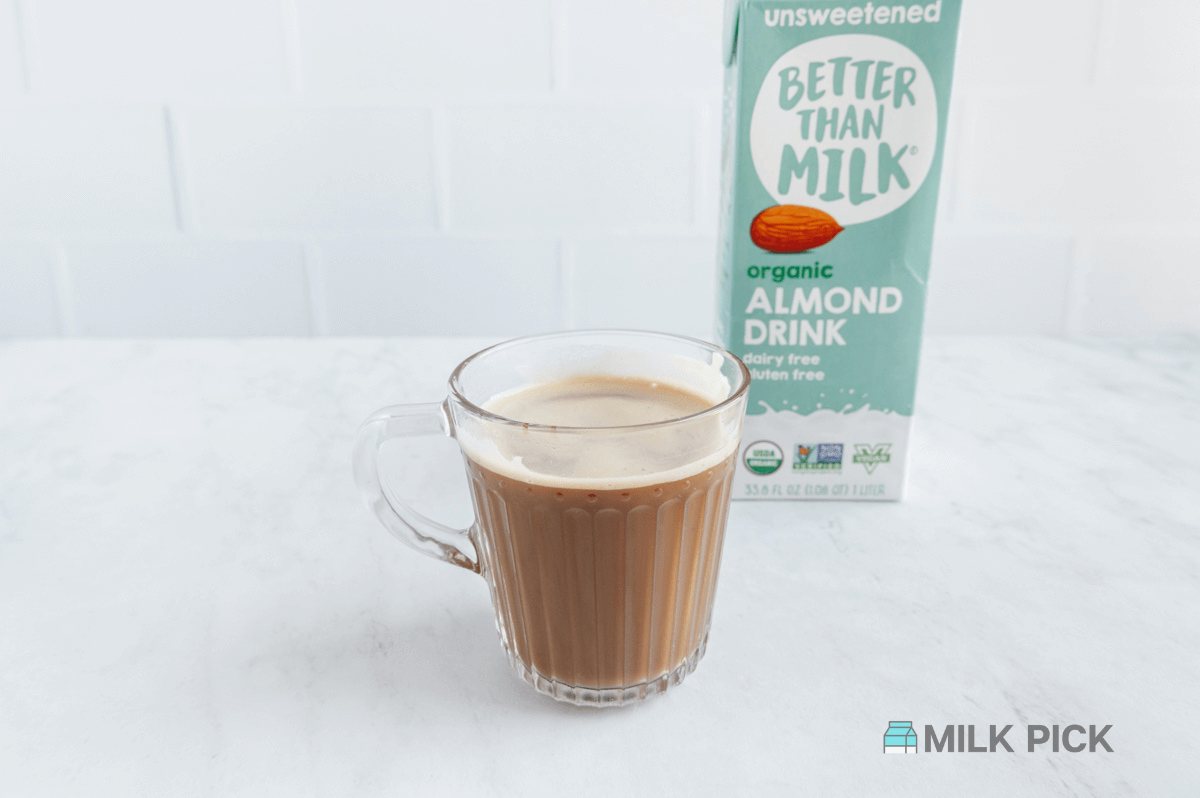
Better Than Milk’s Almond Milk has a concise ingredient list - spring water, organic ground almonds, and locust bean gum.
Locust bean gum is a plant-based product derived from the seeds of carob trees. It is used as a thickening agent and stabilizer in many products.
This almond milk held up very well when added to the coffee. It didn’t separate or coagulate.
The locust bean gum’s stabilizing properties could be a huge help in this almond milk holding up well against a hot cup of coffee.
Elmhurst Almond Milk Barista Edition
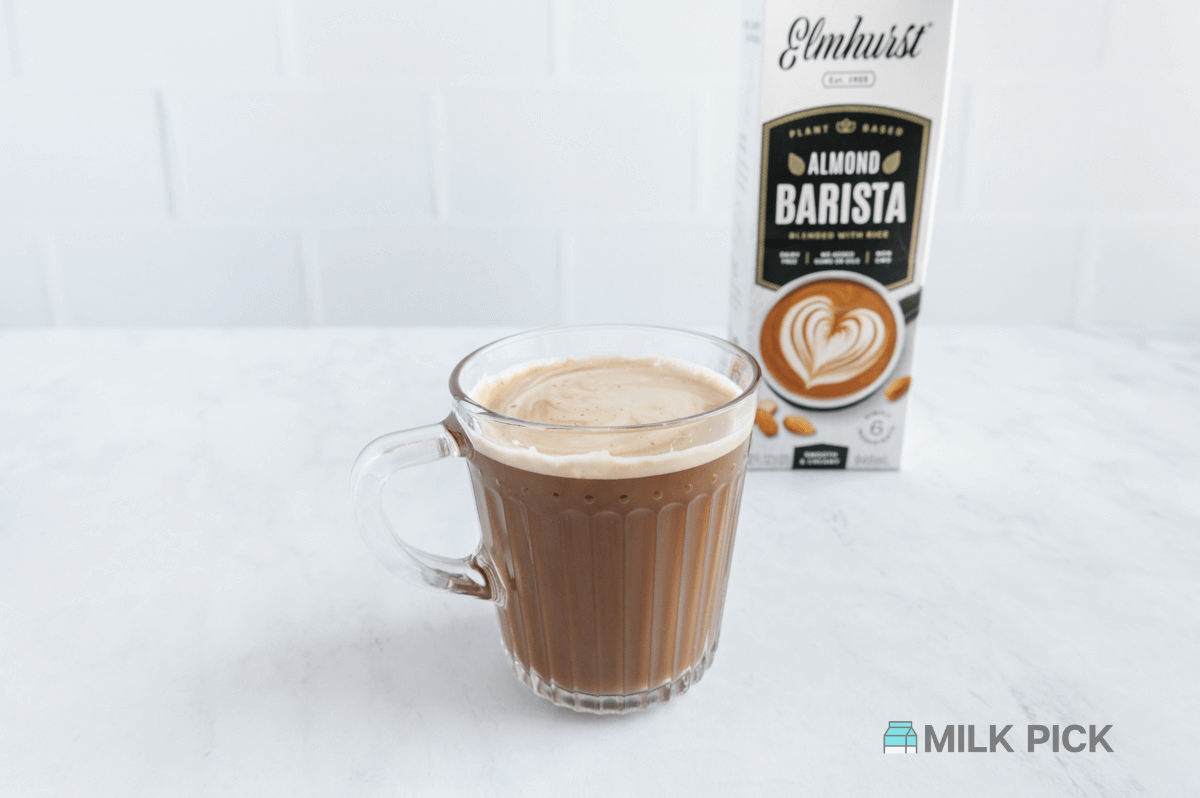
As mentioned above, barista lines are most likely going to be your best bet for pouring into coffee. Barista lines have added ingredients that are designed to help prevent coagulation.
Elmhurst’s Almond Milk Barista Edition contains filtered water, almonds, rice, and 2% or less of cane sugar, dipotassium phosphate, and salt.
Not surprisingly, this barista edition produced a solid, creamy texture when added to the coffee.
The dipotassium phosphate is most likely the additive that helps the almond milk maintain its creamy consistency. Dipotassium phosphate is a stabilizing food additive and it also lowers the acidity levels in food which we know is a big help in preventing curdling.
[lasso ref="amzn-elmhurst-1925-barista-edition-almond-milk-plant-based-vegan-32-ounce-pack-of-6" id="7920" link_id="33990"]
Good Mylk Co Almond Milk Activated Creamer
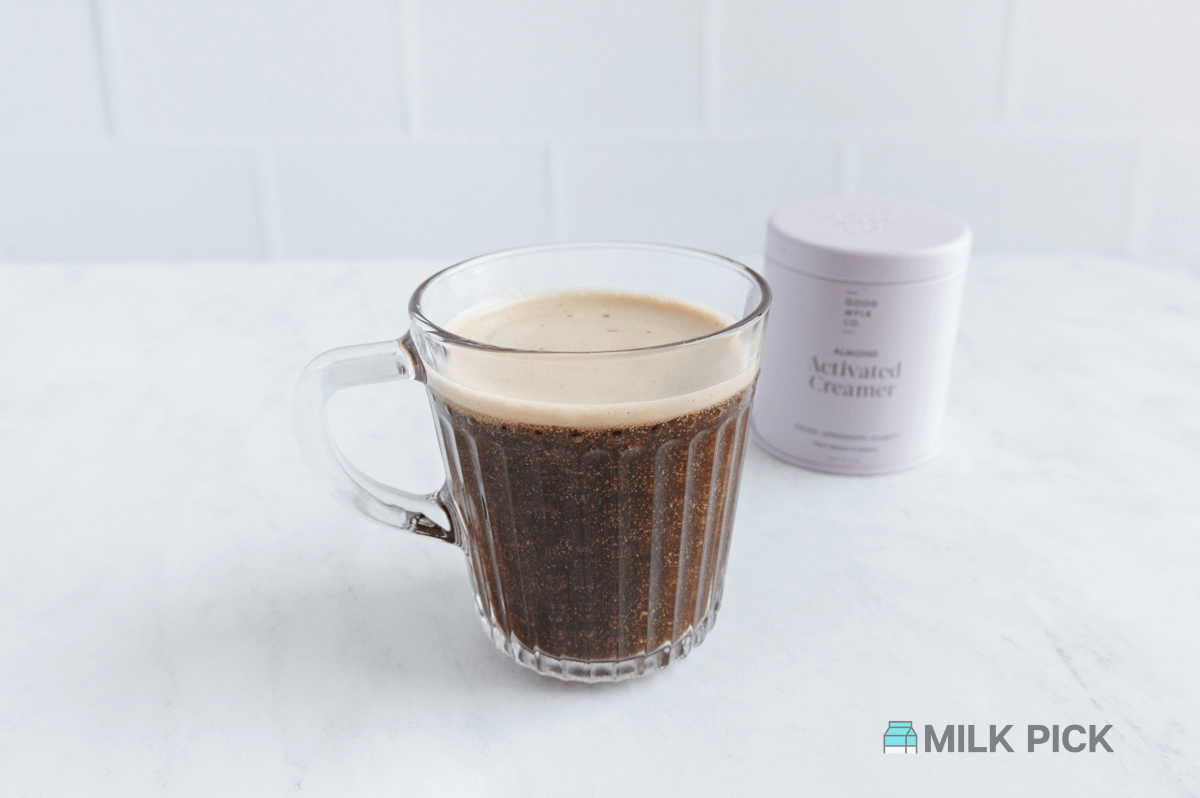
The Good Mylk Co Almond Milk Activated Creamer is different than other almond milk on this list in that it comes in powder form.
It contains sprouted almonds, maple sugar, and Himalayan Pink Salt. I also has Goodmylk’s longevity blend which is tocotrienols, astragalus, lion's mane fruiting body extract, and reishi fruiting body extract.
Sadly, this activated creamer produced an extremely gritty texture that didn’t look or taste too appealing.
Three Trees Organics Original Almond Milk
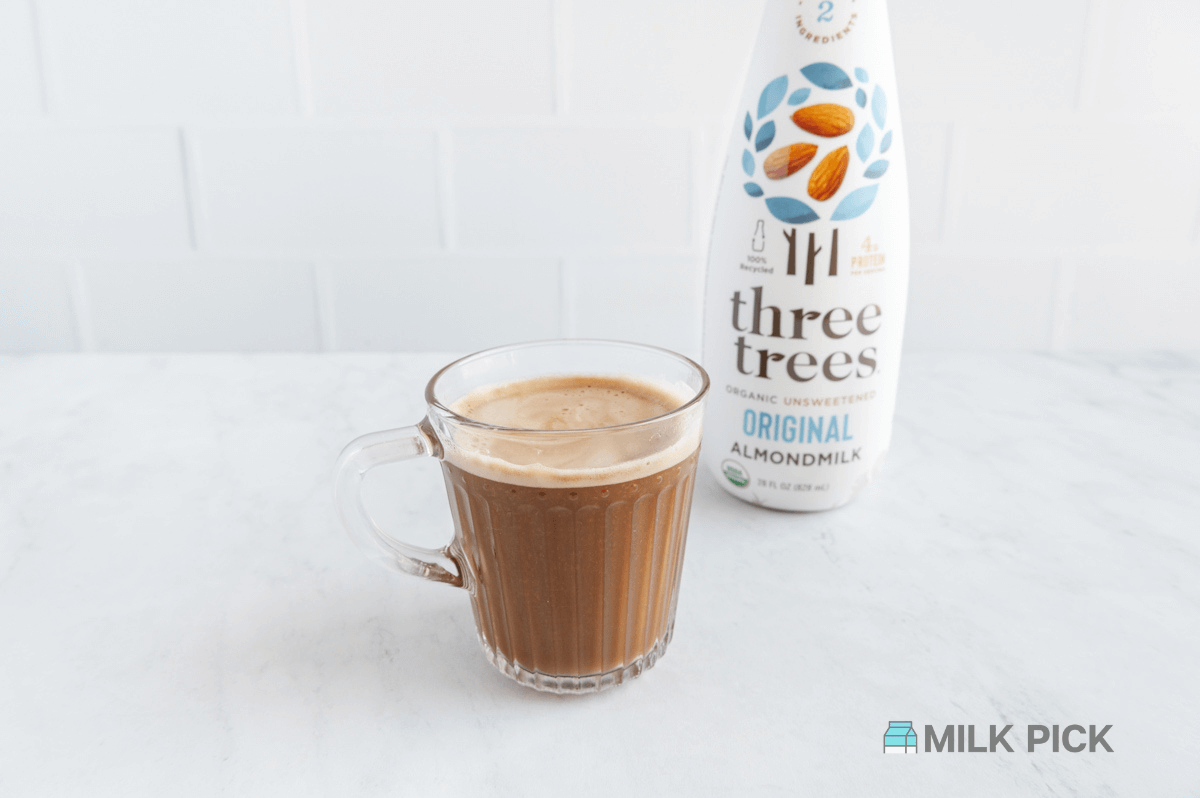
Three Trees Organics keeps it extremely simple. Their almond milk is just filtered water and organic almonds.
When this almond milk was poured into coffee it had a bit of curdling. It wasn’t as much separation as the Almond Malk or the Good Mylk Co, but there definitely was a bit of texture in the coffee.
Even though this almond milk had slight separation, it did score the highest in our “Best Almond Milks for Frothing” test so it gets a few extra points!
Almond Breeze Almond Milk
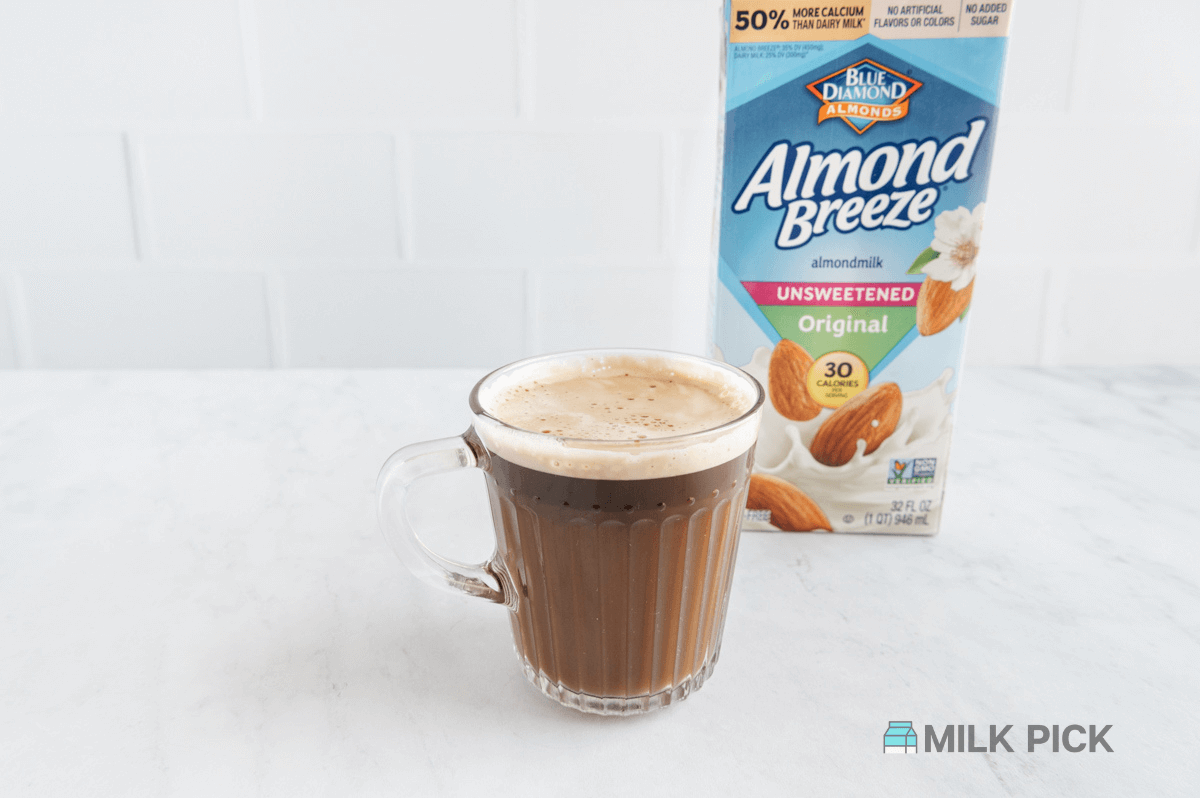
Almond Breeze Almond Milk is a shelf-stable almond milk with the largest ingredient list out of all of the almond milks we are testing today. It contains filtered water, almonds, calcium carbonate, sea salt, potassium citrate, sunflower lecithin, gellan gum, natural flavors, Vitamin A palmitate, vitamin D2, and D-Alpha-Tocopherol.
Almond Breeze held up quite well in this test. It didn’t separate and produced a smooth coffee.
Two ingredients that help the Almond Breeze from not separating are sunflower lecithin and gellan gum.
Sunflower lecithin is an emulsifier that provides stability and prevents separation. Additionally, gellan gum is a plant-based stabilizer derived from fermented starch. It is used to prevent separation and sedimentation.
Silk Almond Milk
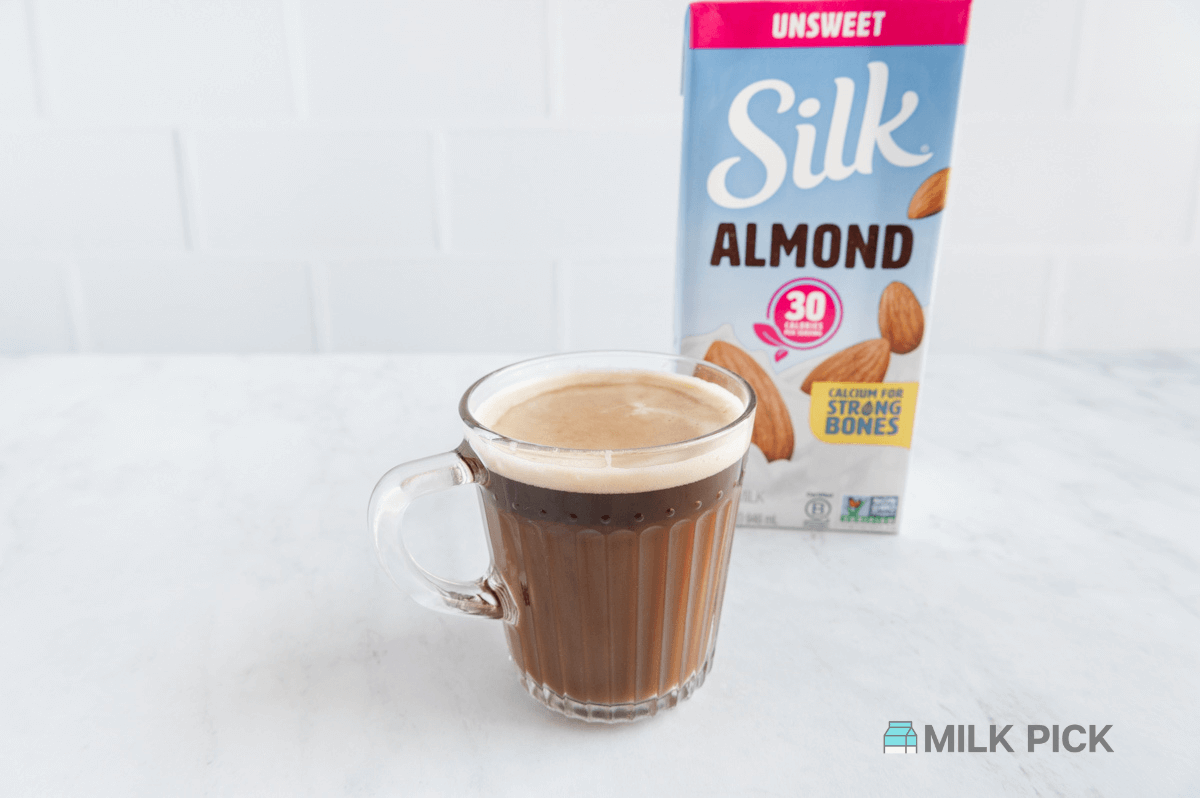
Silk Almond Milk is also a shelf-stable almond milk that has more additives than most of the other almond milks on this list.
It contains filtered water, almonds, and 2% or less of a vitamin and mineral blend, sunflower and/or almond and/or canola Oil, sea salt, gellan gum, ascorbic acid, and natural flavor.
Silk’s Almond Milk did well on this test and didn’t curdle. It produces a solid cup of smooth coffee.
Similar to the Almond Breeze Almond Milk, the gellan gum additive is most likely why this almond milk maintained its consistency and didn't separate when added to the coffee.
Although Silk performed well in our tests, it contains several emulsifiers and natural flavors, which we recommend avoiding if possible.
Ranking the Almond Milk
Now that we’ve put all of the almond milk brands to the test, here is the order (from best to worst) of which almond milks stood up well in the curdling test:
- Elmhurst Almond Milk Barista Edition
- Better Than Milk Almond Milk
- Tied: Silk Almond Milk & Almond Breeze Almond Milk
- Three Trees Organics Almond Milk
- Almond Malk
- Good Mylk Co Activated Creamer
Keep in mind that while Silk and Almond Breeze did well in terms of curdling, you should also consider the ingredients in your almond milk.
We'd recommend sticking to Elmhurst, Better Than Milk or Three Trees for your coffee if they're available (Elmhurst can be ordered online).
Enjoy Almond Milk Without Curdling!
For those wanting a dairy-free option to add to their morning coffee, almond milk is a terrific choice.
However, cold almond milk is prone to curdling in hot coffee.
Luckily, you can prevent your almond milk from curdling in coffee if you focus on balancing the temperatures between the two, lowering the acidity levels, or selecting the right almond milk for the job!
FAQs
Does Almond Milk Curdle with Lemon?
Almond milk does curdle when mixed with lemon juice.
Any strong acid can make almond milk curdle, because it affects the structure of the drink, just as it does with dairy milk.
That may be a benefit. you can use curdled almond milk as a replacement for buttermilk, ensuring that you always have a soured milk product to hand even if you have gone dairy free and you don’t want to use traditional buttermilk.
Does Almond Milk Curdle in Hot Tea?
Not all almond milk will curdle in hot tea, but it often will, especially if the tea is very hot and the milk was very cold.
Almond milk often reacts to hot liquids by splitting and separating. It’s still safe to drink it in your tea, however; there is nothing to worry about if it does curdle.
Does Almond Milk Curdle in Coffee?
Yes, almond milk frequently curdles in coffee, as coffee is both hot and acidic.
These are the two major triggers for almond milk curdling, so it is quite likely that your almond milk will curdle if you add it directly to a cup of coffee.
Again, this will not always happen, but it’s a common occurrence.
Will Almond Milk Curdle with Vinegar?
Yes, almond milk will curdle if it is mixed with vinegar.
Any acidic substance is likely to make almond milk split and curdle.
This is another good way to make vegan buttermilk.
Does Almond Milk Curdle with Alcohol?
Alcohol can curdle almond milk, but it will not always do so.
It’s possible to make certain alcohol drinks with almond milk in them, but a strong alcohol is likely to curdle the almond milk.
This is because alcohol is acidic, and the acidity affects the almond milk.
If you are going to mix alcohol and almond milk, test a small amount first and pour the almond milk in slowly.
Does Almond Milk Curdle When Heated?
Almond milk often does curdle when it is heated, yes, but usually only if it is brought to a rolling boil.
How resistant your almond milk is to curdling will depend to some extent on what other ingredients it contains, but most almond milks will curdle if you heat them too much.
Is It Ok to Drink Separated Almond Milk?
Separated almond milk is fine to drink and you won’t do yourself any harm by consuming it.
It may not look particularly appealing, but it’s not moldy or “off” in any other way.
You may find that it doesn’t make drinks taste very creamy, however, so be aware of this if you are using it for coffee.
Can You Drink Curdled Almond Milk?
Curdled almond milk isn’t harmful, although it may not look particularly appealing.
It might look like the milk has gone off, but all that has actually happened is some particles have separated from others, changing the texture.
There is no additional bacteria, and no increased risk of food poisoning. Curdling is simply a physical change, and curdled almond milk is perfectly safe to drink.
However, it is not particularly enjoyable.
Many people find the texture off-putting and do not want to consume it.
It also doesn’t make drinks as creamy and tasty, so it doesn’t serve its purpose particularly well when added to hot drinks.
